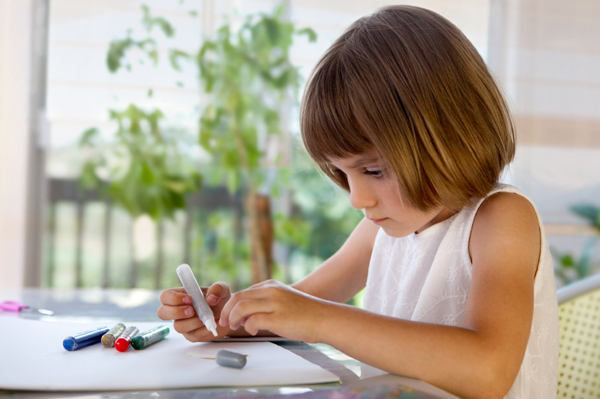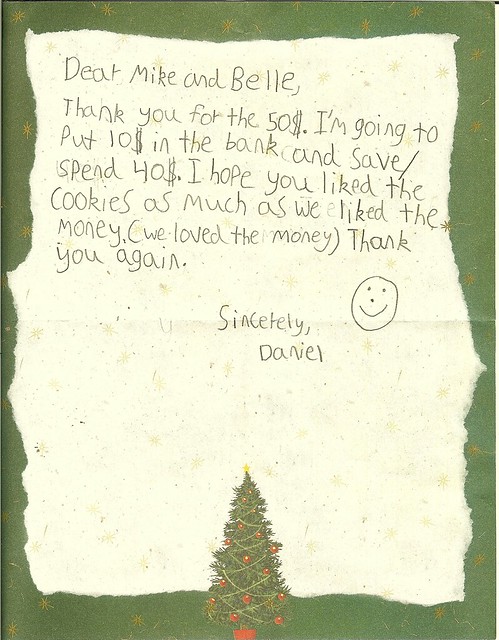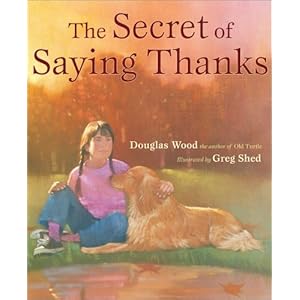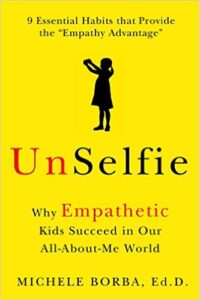REALITY CHECK: Did you know that writing a “thank you” note is a simple, proven way to boost your child’s gratitude? That’s what researchers from the University of California at Davis and Southern Methodist University found. But that’s not all: researchers also discovered that being thankful might be the key to raising your child’s happiness and well-being.
For the past ten years two professors, Robert Emmons and Michael McCollugh, have examined date of several hundred people who were involved in their simple gratitude experiments.
One ten-week study asked a group to write down five things in a journal they were grateful for that happened in the last week for four days a week.
A second group listed ways they were better off than others as a way to appreciate their blessings. The psychologists then looked at the medical and psychological tests of each participant prior to the study, and then again ten weeks later.
Those simple gratitude exercises made those participants, feel 24 percent happier.But that’s not all: the students were also more optimistic about the future, felt better about their lives, slept better, felt healthier and less stressed, were less materialistic and more likely to help others. And those results were not hard to achieve.

Best yet, you can help your child reap some of those results just by encouraging them to write thank you’s. But the truth is not all kids are excited to sit down and write those notes. Do any of these sound familiar?
“I know my teacher gave me a present, but she’s getting paid for being nice.”
“Why should I write Grandma a thank you note? I told her ‘thanks’ already.”
“But it takes too much time! Can’t I just text a thank you?”
If those comments are ones that your own child may be uttering, know you’re not alone. While kids love receiving those gifts, writing those thank yous is plain drudgery to most. But writing thank-you cards is a habit we should encourage in our children for a few important reasons. Here are just four benefits of having kids take time to write those notes.
 4 Values of Writing Thank Yous
4 Values of Writing Thank Yous
~ Conveying thanks is a simple, proven way to boost kid gratitude.
~ Kids learn to consider other people’s feelings rather than just their own.
~ It helps children understand that we expect them to use the practice of appreciation.
~ They bring back that glorious endangered tradition of the hand-written note and penmanship.
9 Creative Kid Options for Writing Those Thank You’s
The problem for most parents is getting kids to write them without it turning into a struggle. One trick is to allow kids to create their own way of thanking the person. Of course, you can always give kids markers, crayons, and paper and let their creative juices go. But here are a few fun thank-you card ideas kids can do to express their gratitude. Do ask your kids for more suggestions.
1. Video It
Make a tape of video just for that person that expresses appreciation and send it.
2. Photo Op
Take a photo of the child wearing or using the gift. The developed four-by-six inch print makes an instant postcard; the child just writes a brief note on the back and addresses and mails it.
3. Make A Puzzle
Write the thank you on a piece of card stock and then cut it into a few pieces like a jigsaw puzzle.
4. Do a Cereal Spell Out
Spell out the thank you use M&M’s or alphabet cereal glued on a piece of cardboard.
5. Press a Flower
Pick a flower and press it flat for a few days between wax paper arranged inside a heavy book. Once the flower is pressed send it inside a heavy piece of folded paper with a note. (And makes a great bookmark!)
6. Mirror it!
Print the thank you using “mirror-image” writing (completely backwards). Both the child and the recipient generally have to use a mirror to decipher what the message says.
7. Skype it!
Seeing the recipient up close and personal as the child conveys his thanks is a proven way to boost gratitude. Just have the child write a few lines (say it’s “like a screenplay”) prior to the call to help think through his reasons.
8. Fill in the Blanks
Younger kids will have a harder time with those thank yous. So fill free to give them a template to fill in – or they can dictate their thoughts to you as you write down the words.
9. Send an E-card
If you can’t get beyond the struggle, then at least have your child choose from a variety of online thank you cards to fill out and send.
One way to instill your expectations is to reinforce one simple family rule: “You must write the thank you note first, and then you may use the gift.” From experience I can say this one really speeds up the process!
Don’t Forget Your Example!
Kids learn gratitude by seeing others display appreciation in everyday, unplanned moments. So make sure your child is watching you write those thank you notes! (And while you’re at it, ask yourself how often your kids see you convey your appreciation with hugs, words or small notes to others? How often do you tell your kids how much you appreciate them? Tune up your attitude of gratitude so that your kids are more likely to copy your example.
Most parents agree it’s a lot easier to have all those family members sit down and write their notes together. Just do consider the child’s age and ability to your expectations. While one kid can write all his notes in one sitting, other children may need to extend the task to one or two cards a day. Manner experts even provide guidelines for those cards. School-age kids should use this rule of writing thank you notes from the Etiquette and Leadership Institute in Athens, Georgia:
The total number of sentences in a thank-you note should be half the child’s age. So a ten-year-old should be expected to write a minimum of five complete sentences. A young child can dictate his comments and only needs to sign his name.
Kid Books on “Gratitude Power”
Looking for a good kid book that expresses the power of gratitude and why sending thank yous are important? Here are three of my favorites.
The Thank You Book for Kids: Hundreds of Creative, Cool and Clever Ways to Say Thank You!
Love this one and it’s written by fourteen-year-old, Ali Lauren Spizman who is already a media veteran. Ali has appeared in television commercials, print advertising, radio interviews, and on The Cartoon Network in 1997 as a featured commentator. Best yet, every birthday since she was four, Ali has chosen to donate clothes and toys to a homeless shelter. And she has been writing thank-you letters since she was a little girl. She currently resides in Atlanta, Georgia with her family and has written a great book for kids filled with clever ways to make the often dull task of writing thank-you notes into an exciting exercise in creativity.
The Secret of Saying Thanks
 “Perhaps you’d like to know a secret, one of the happiest ones of all. If you’ve not yet discovered the secret of saying thanks, it’s waiting for you.” In the inspirational text that made him a bestselling, internationally acclaimed author, Douglas Wood offers a spiritual homage to nature and the world. Greg Shed’s stunning portraits of the natural world tenderly portray all of the many ways in which we can say thanks for the wonders we sometimes take granted in life.
“Perhaps you’d like to know a secret, one of the happiest ones of all. If you’ve not yet discovered the secret of saying thanks, it’s waiting for you.” In the inspirational text that made him a bestselling, internationally acclaimed author, Douglas Wood offers a spiritual homage to nature and the world. Greg Shed’s stunning portraits of the natural world tenderly portray all of the many ways in which we can say thanks for the wonders we sometimes take granted in life.
The Kids’ Guide to Writing Thank You Notes
 This “how-to” for kids by Jean Summers explains in a conversational tone why thank-you notes are important (and not just for those occasions when you get a gift), and teaches kids how to write them in five quick steps. For kids stumped for inspiration, the book includes a dozen sample notes and a list of fifty adjectives to describe just about every gift. There are even fill-in-the-blanks forms to get kids going.
This “how-to” for kids by Jean Summers explains in a conversational tone why thank-you notes are important (and not just for those occasions when you get a gift), and teaches kids how to write them in five quick steps. For kids stumped for inspiration, the book includes a dozen sample notes and a list of fifty adjectives to describe just about every gift. There are even fill-in-the-blanks forms to get kids going.
These are my three kid books on gratitude. What are your favorite books for kids? Do you have a clever way to get your kids to write thank yous? If so, please share!
Dr. Michele Borba, Parenting Expert
 I am an educational psychologist, parenting expert, TODAY show contributor and author of 24 books including The Big Book of Parenting Solutions: 101 Answers to Your Everyday Challenges and Wildest Worries. You can also refer to my blog, Dr. Borba’s Reality Check for ongoing parenting solutions and late-breaking news and research about child development.
I am an educational psychologist, parenting expert, TODAY show contributor and author of 24 books including The Big Book of Parenting Solutions: 101 Answers to Your Everyday Challenges and Wildest Worries. You can also refer to my blog, Dr. Borba’s Reality Check for ongoing parenting solutions and late-breaking news and research about child development.
My latest book, UNSELFIE: Why Empathetic Kids Succeed in Our All-About-Me World aims to create a conversation that makes us rethink our view of success as exclusively grades, rank and score and includes traits of humanity! It’s time to include “empathy” in our parenting and teaching if we hope to prepare children to succeed and thrive in our global new world.

